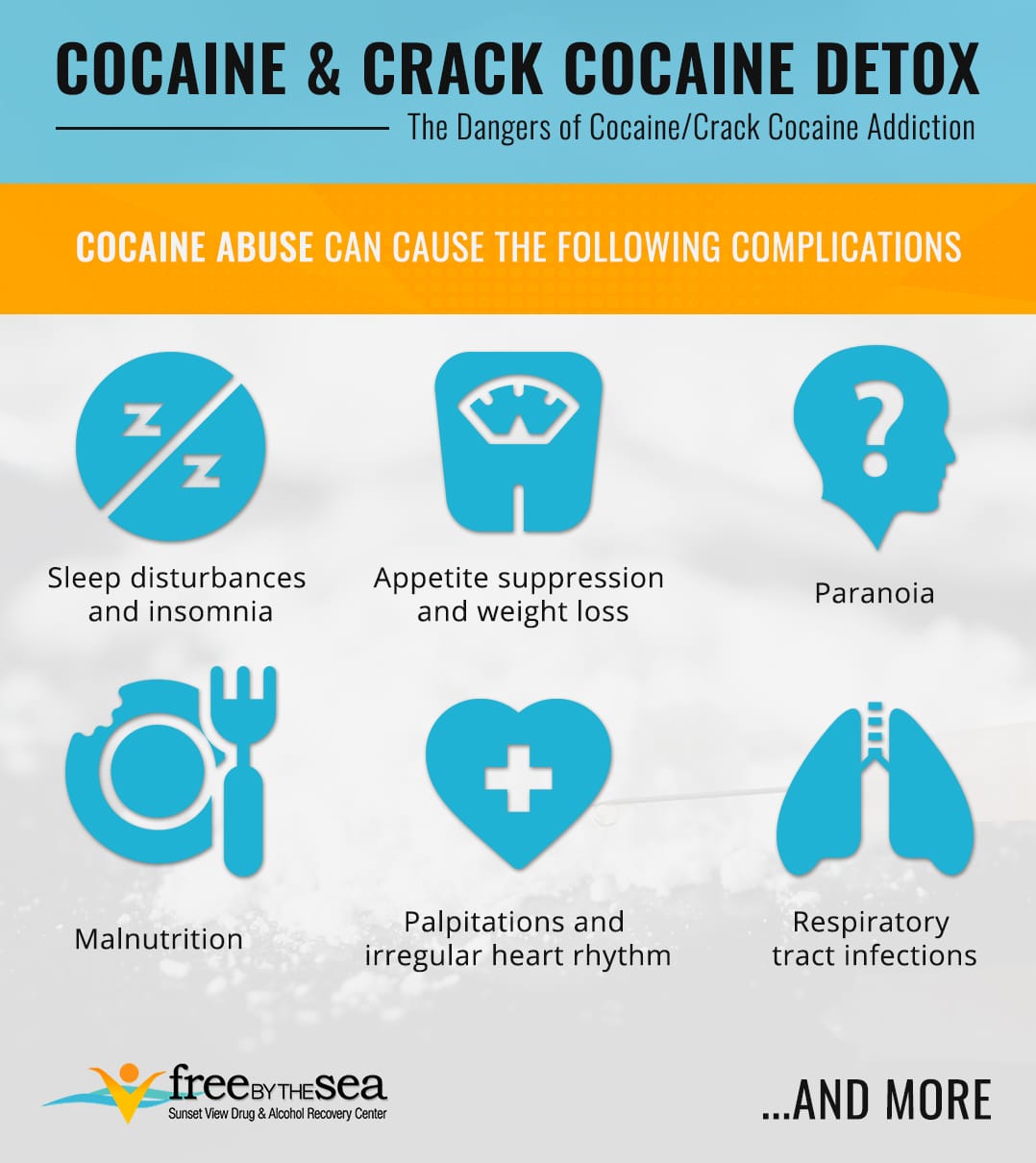Cocaine is a frighteningly addictive drug, and just one use can cause the user to experience cocaine withdrawal symptoms. Continued use has become progressively more commonplace in the past few decades, with its detoxification routine being one of the toughest to complete successfully. But with the proper help and support, cocaine detoxification and rehabilitation are possible.
Free by the Sea will align you with the best cocaine detox facilities in the Pacific Northwest and surrounding areas. Our staff will assist you with detox placement should you or your loved one require this service prior to entering our cocaine addiction treatment program.
What is Cocaine?

Cocaine is a type of stimulant drug that is made from the leaves of the coca plant, which grows abundantly in a small region of the Andes Mountains in South America. There are only two types of coca leaves that contain enough cocaine alkaloids to be used in the production of cocaine, but they can be harvested 3-6 times a year. Once harvested, they’re sent to be processed in labs, and other substances and chemicals can be added to them.
Cocaine can come in several different forms. Most of the time, it comes in a white powder form that can be snorted, rubbed on the inside of the mouth, injected through a syringe, or smoked in a crystal form known as “crack.” Crack cocaine makes users feel high by preventing the brain from recycling a pleasure-causing neurotransmitter called dopamine. As a result of using cocaine, excess dopamine floods the brain, which rapidly causes down-regulation, or “burning out,” of dopamine receptors.
Understanding Cocaine Addiction
Receiving treatment for an addiction to crack cocaine can help users quit their habit and start enjoying a healthy, sober life again. Crack cocaine, commonly known as “crack,” is a variety of cocaine that has undergone chemical alteration to not only make it smokable but also faster and stronger-acting, leading to crack cocaine withdrawal symptoms. This drug looks similar to soap flakes but is hard and brittle. Crack’s effects are short-lived compared to those of typical powder cocaine, so people who use it often do so repeatedly within a short period to maintain their high.
Crack cocaine is among the most addictive drugs available, and naturally, repeated use results in the development of tolerance. Tolerance occurs when the brain becomes used to the drug, requiring increasingly larger or more frequent doses to achieve the same effects. The problem most people don’t understand is that just one use can be enough to provoke dependence, so they’re willing to try the substance for the first time without knowing this.
Health Issues Related to Cocaine Addiction

Here at Free by the Sea in Washington, we want to make you aware of the potential health risks you could be subjecting yourself to if you choose to participate in crack use. Because of its highly addictive qualities, once use starts, it’s hard to stop.
Here are some of the health risks you may face if you use crack cocaine on a daily basis for a prolonged period of time:
- Palpitations and irregular heart rhythm
- Respiratory tract infections
- Sleep disturbances and insomnia
- Hallucinations and delusions
- Paranoia
- Appetite suppression and weight loss
- Malnutrition
- Excessive sweating and dehydration
- Restlessness
- Dizziness, nausea, and vomiting
- Headaches
- Heart attack and stroke
- Seizures
- Sexual dysfunction
- Psychosis
- Coma and death
Other Risk Factors of Cocaine Use
Another common issue when using crack cocaine is that it makes people significantly more likely to engage in high-risk behaviors. Crack users often display poor judgment, putting both the safety and health of themselves and others at risk.
Such actions can include unsafe sex, driving while intoxicated, and sharing dirty needles or crack pipes. These unsafe behaviors can lead to unplanned pregnancies, which are particularly hazardous because they can result in postnatal addiction and birth defects if the expecting mother doesn’t stop using crack.
Co-Occurring Disorders
Individuals who are addicted to crack cocaine may struggle with severe depression and anxiety as the drug begins to wear off, ultimately requiring dual diagnosis treatment. Crack can also cause violent behavior, which endangers anyone around the addict. To avoid feeling this way, crack cocaine users often resort to using more of the drug as soon as they notice the effects starting to dwindle.
Depending on the degree and length of use, crack addicts may struggle with long-term mood disorders, even after stopping their crack use. In many cases, it takes a dire event to awaken crack users to the fact that they need to enroll in a treatment and rehabilitation program for crack cocaine addiction.
Recognizing the Need for Crack Cocaine Addiction Treatment

Because crack cocaine is extremely addictive, the drug often has a severe impact on the lives of people who abuse it, including mood swings. There are several signs that someone is in need of addiction treatment, such as:
- Losing control over the degree and frequency of crack use
- Becoming isolated from friends, family, and significant others
- No longer feeling interested in activities or hobbies that were once enjoyable
- Feeling like crack cocaine is necessary to maintain normal functioning
- Experiencing powerful cravings for crack
- Spending large sums of money to buy crack cocaine, even when it can’t be afforded
- Engaging in dangerous or illegal activities to obtain more crack
- Erratic behavior and unstable mood
- Displaying uncharacteristic irritability, aggression, or hostility
Individuals who use crack cocaine alongside alcohol are at an even greater risk of harm than people who use just one or the other. Crack and alcohol interact with one another in the liver, creating a toxic metabolic by-product known as cocaethylene. This bolsters the psychoactive effects of the crack, making the user feel much higher. However, cocaethylene also increases the odds of sudden cardiac death, which can lead to a heart attack.
Cocaine Detoxification and Withdrawal Symptoms

Cocaine detoxification is the first step in treating crack cocaine addiction. During cocaine detoxification, the recovering addict ceases all use of the drug while medically managing withdrawal symptoms. Gradually cutting down crack cocaine usage is not necessary, so the majority of treatment centers encourage patients to stop using the drug fully and immediately.
Cocaine withdrawal symptoms describe the state of shock your body goes into when it doesn’t have the substance it relied on for such a long period of time. In most cases, these symptoms won’t last more than a week, but some symptoms may take longer to resolve, depending on the person’s level of dependence and duration of use. While there are no medications available right now that can ease the side effects of crack withdrawal symptoms, including psychological withdrawal symptoms, several are currently being studied and have shown promising results.
Examples of Cocaine Withdrawal Symptoms
People who experience withdrawal symptoms during cocaine detoxification normally experience them within a few hours of stopping use. The symptoms can sometimes be severe and include:
- Depression
- Anxiety and panic attacks
- Extreme agitation
- Powerful crack cocaine cravings
- Fatigue, sometimes causing the person to sleep for more than a day
- Lack of pleasure (anhedonia)
- Appetite rebound
Even though we don’t offer cocaine detoxification treatments, Even though we don’t offer cocaine detoxification treatments, our staff at Free by the Sea in Washington is able to recommend the most respected facilities for your medical detox. After you have completed cocaine detoxification, you’ll be admitted to one of our inpatient programs or outpatient programs to complete the rest of your treatment.
Inpatient vs. Outpatient Cocaine Treatment
Choosing what level of rehab is right for you could be what determines a full recovery from your cocaine addiction. Here at Free by the Sea, we offer both inpatient and outpatient care. This allows all of our current and future patients to create a personalized treatment plan that best fits their needs and severity of their addiction. The difference between the two is the intensity level of the care that is given.
Inpatient treatment program
Inpatient treatment is meant for those who have a severe addiction and need 24/7 supervision in order to stay on track with their treatment and not fall back into old patterns. This type of treatment may also benefit those who have constant temptation from family and friends at home who also use cocaine. In our inpatient facilities, our patients not only receive one-on-one therapy from our counselors but also can mingle and connect with other patients through group activities.
Outpatient treatment program
Our outpatient treatments are for those with less serious addictions, which most cocaine users fall under. They will be able to maintain their normal schedule of going to school or work and also attend weekly therapies and group sessions to support their recovery. We offer this type of care because we understand our patients are expected to provide for their families or want to continue earning their degrees while receiving treatment for their cocaine addiction.
Whether you choose outpatient or inpatient treatment, we promise to offer the highest level of care available in our facilities. We work tirelessly to ensure our patients receive the care they need and that their needs are met.
Why Choose Free by the Sea as Your Treatment Center?

Located in Ocean Park, WA, our community of dedicated professionals is committed to providing care to all individuals with dignity and respect. We are able to house 77 patients at a time while they receive high-quality,evidence-based cocaine addiction treatment. Our treatment programs offer crack cocaine detox with medical supervision and are equipped to manage uncomfortable withdrawal symptoms, including physical symptoms, mood swings, and mental illness—all within a controlled environment.
Our Programs for Cocaine Abuse
Patients are evaluated and placed into residential, partial hospitalization, or intensive outpatient levels of care based on the severity of their addiction. Once admitted, our certified substance abuse counselors use DBT, CBT, EMDR, and trauma-informed treatment to address the underlying issues of addiction. We have found that some of these can include depression, anxiety, self-esteem, and relationships.
Once the root of the addiction has been recognized, our specialists will teach relapse prevention techniques to our patients and educate them on why addiction happens in order to help them maintain a sober lifestyle once treatment has been completed. Our patients will also relearn important life skills that they may not have been practicing while under the influence of their addiction.
Therapists will conduct twelve-step meetings that include celebrating recovery, dual disorder, and AA/NA/GA. These meetings give our patients a chance to bond by sharing their stories of addiction, and they will be able to lean on each other during times of hardship in rehab.
Recover in a Serene Environment
We also understand that, in order to heal mentally from addiction, our patients must also heal physically. Our campus is located on five acres facing the Pacific Ocean, where our patients can take walks on the beach and exercise in our multi-sport areas that include volleyball courts, basketball courts, and an exercise room. Our meal halls provide nutritionally designed meals to restore internal health and promote healthy habits for later in life.
Contact Us Today
Once you finish the cocaine detoxification process, you might feel like you need professional treatment to help reclaim your life. Free by the Sea provides several programs designed to help you pinpoint the actions and thoughts that may have factored into your drug use.
Located on the coast of the beautiful state of Washington, Free by the Sea is ready to help you develop and nurture the behaviors and habits necessary for successfully maintaining a drug-free lifestyle. Please contact our office to learn more about how Free by the Sea can help you.

Dr. Richard Crabbe joined our team in 2019 as our psychiatrist and medical director. He attended the University of Ghana Medical School where he became a Medical Doctor in 1977. From 1978 through 1984, he was a medical officer in the Ghana Navy and provided a variety of services from general medicine to surgeries. He received his Certificate in General Psychology from the American Board of Psychology and Neurology in 2002.
Insurances We Accept
Free by the Sea recognizes the importance of having insurance to receive addiction treatment. Let us work with you to provide you or a loved one with premier addiction treatment services. We accept several private insurance plans. Verify your rehab coverage with us today to ensure you receive the support that you need! Find out if you are covered today!











